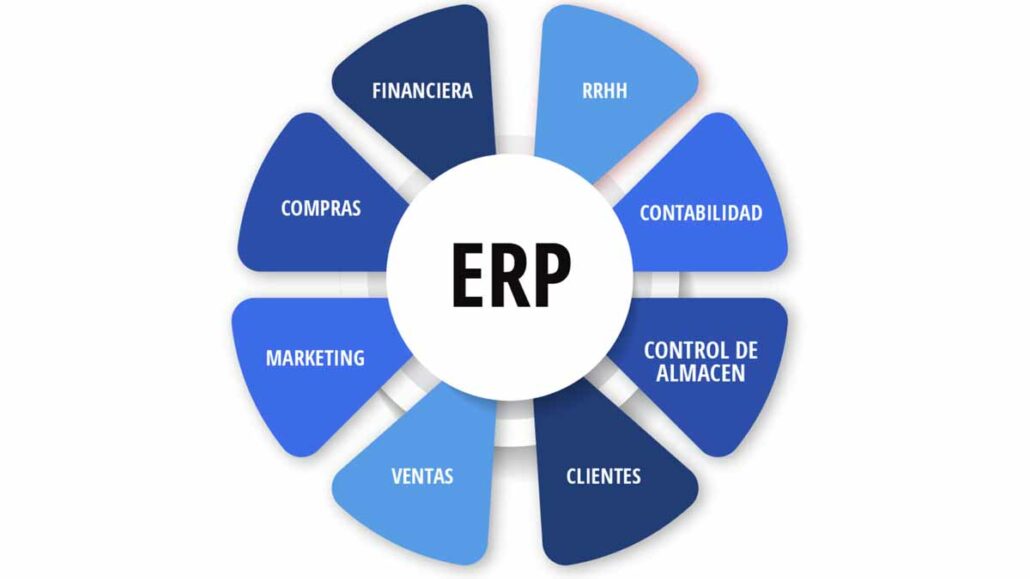In today’s fiercely competitive manufacturing landscape, streamlining operations and maximizing efficiency are paramount. Here’s where Enterprise Resource Planning (ERP) for Manufacturing Companies emerges as a game-changer. This in-depth guide delves into how ERP empowers manufacturing companies to achieve peak performance, optimize resources, and gain a significant edge.

What is ERP and Why is it Crucial for Manufacturers?
ERP is a comprehensive software suite that integrates and manages core business functions within a manufacturing company. It acts as a central hub, consolidating various departments (production, inventory, finance, sales) into a unified platform. Gone are the days of siloed data and disconnected processes. With ERP, manufacturers gain a holistic view of their operations, enabling informed decision-making and improved agility.
Benefits of ERP for Manufacturers:
Enhanced Efficiency
ERP automates repetitive tasks, streamlines workflows, and eliminates manual data entry errors. This translates to faster production cycles, reduced lead times, and ultimately, increased output.
Inventory Optimization
ERP provides real-time inventory visibility, allowing manufacturers to maintain optimal stock levels, minimize waste, and prevent stockouts. This translates into cost savings and improved responsiveness to customer demands.
Improved Production Planning and Scheduling
ERP facilitates accurate forecasting, resource allocation, and production scheduling. This allows manufacturers to plan, optimize resource utilization, and mitigate production bottlenecks.
Enhanced Quality Control
ERP integrates quality management processes, enabling real-time tracking of defects and facilitating proactive measures to ensure consistent product quality.
Streamlined Supply Chain Management
ERP fosters seamless communication and collaboration with suppliers. Manufacturers can readily track materials, anticipate shortages, and optimize supplier relationships.
Data-Driven Decision Making
ERP provides comprehensive business intelligence, offering valuable insights into costs, production performance, and customer trends. This empowers manufacturers to make informed decisions based on real-time data.
ERP Features for Manufacturing Success
- Production Management: Manage production plans, schedules, work orders, and shop floor control.
- Inventory Management: Track raw materials, and finished goods, and streamline warehouse operations.
- Supply Chain Management: Manage supplier relationships, optimize procurement, and track deliveries.
- Quality Management: Track and monitor product quality, analyze defects, and implement corrective actions.
- Customer Relationship Management (CRM): Manage customer interactions, quotes, orders, and track service requests.
- Financial Management: Manage accounts payable and receivable, streamline payroll, and generate detailed financial reports.
Choosing the Right ERP for Your Manufacturing Needs
With a diverse ERP landscape, selecting the ideal solution requires careful consideration. Here are some key factors to evaluate:
- Company Size and Needs: Choose an ERP solution that scales with your company’s growth and caters to your specific manufacturing processes. (Discrete vs. Process Manufacturing)
- Implementation and Integration: Consider the ease of implementation, potential for customization, and seamless integration with existing systems.
- Scalability and Flexibility: Ensure the chosen ERP can adapt to future growth and accommodate changing business needs.
- Vendor Reputation and Support: Opt for a reputable vendor with proven experience in the manufacturing industry and a robust support system.
Implementing ERP for a Smooth Transition
ERP implementation can feel daunting, but a well-defined strategy ensures a smooth transition. Here’s a breakdown of the key steps:
- Define Requirements: Clearly outline your business goals and specific functionalities needed from the ERP system.
- Select a Vendor: Conduct thorough research, compare solutions, and choose a vendor that aligns with your needs and budget.
- Data Migration and System Configuration: Plan and execute data migration from existing systems and configure the ERP to match your workflows.
- User Training and Change Management: Provide comprehensive training for all teams to ensure optimal utilization of the ERP system.
- Ongoing Support: Establish clear lines of communication with the vendor for ongoing support and assistance.
Cloud-Based Solutions and Beyond
Cloud-based ERP solutions are gaining traction due to their scalability, affordability, and ease of access. These solutions eliminate on-premise infrastructure costs and enable real-time data access from anywhere, anytime.
FAQs on Manufacturing ERP
Is ERP necessary for small manufacturing companies?
Yes, ERP can be extremely beneficial for small manufacturers. It can help automate tasks, improve efficiency, and provide valuable insights for growth. Many vendors offer affordable solutions specifically designed for small businesses.
What are the challenges of implementing an ERP system?
Data migration, user training, and change management can be challenging aspects of ERP implementation. Choosing an experienced implementation partner can help mitigate these challenges.
How long does it take to implement an ERP system?
Implementation timelines can vary depending on the complexity of the system and the size of your company. It typically takes several months to a year for a full ERP implementation.
Conclusion
Investing in an ERP system is a strategic decision that empowers manufacturers to achieve operational excellence. This comprehensive guide has equipped you with the knowledge to understand the potential of ERP, navigate the selection process, and ensure a successful implementation. By embracing ERP, manufacturing companies can unlock a new era of efficiency, agility, and long-term success.

